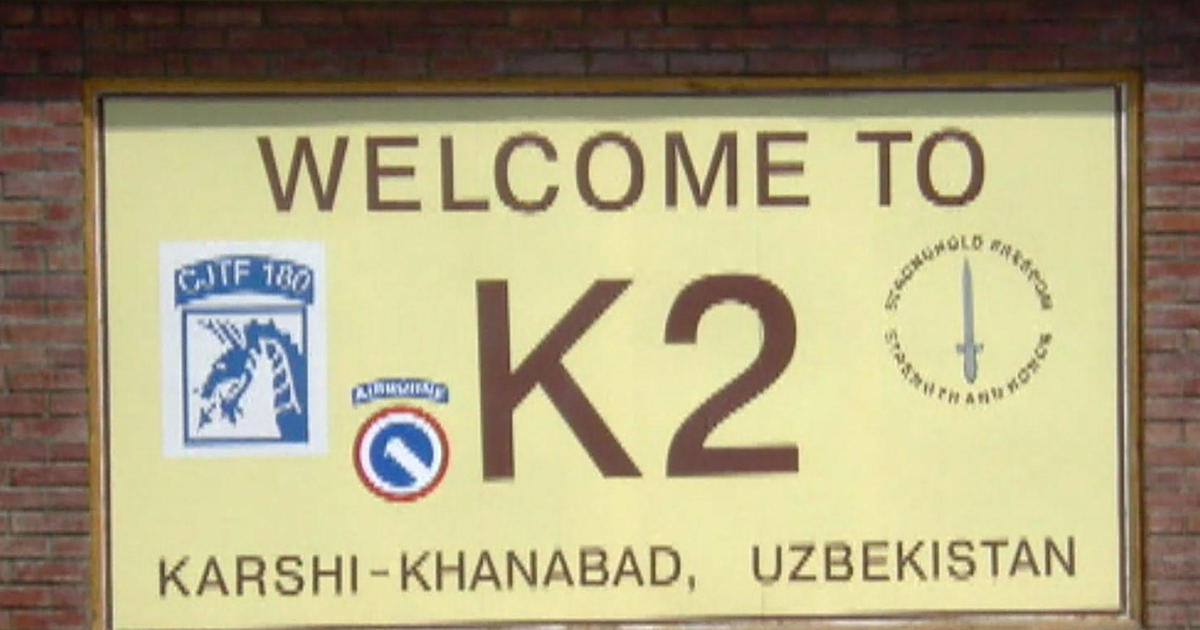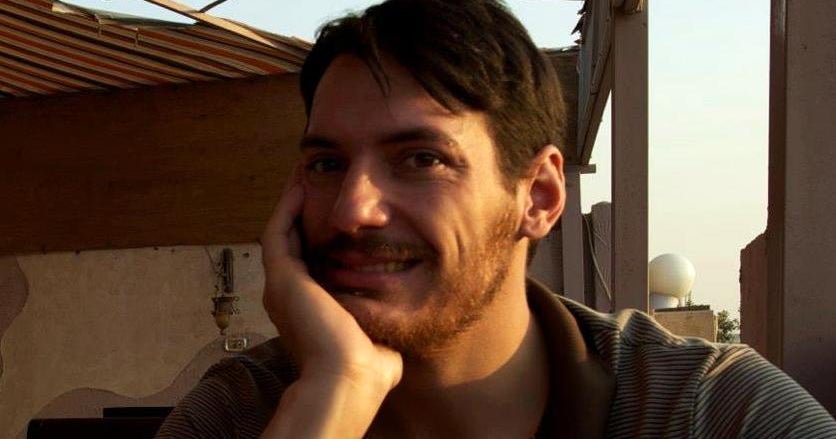CBS News
Veterans advocate claims “smoking gun” records prove toxic exposure at military base

Newly uncovered military records obtained by CBS News may explain rare cancers and other illnesses among U.S. servicemembers deployed to an overseas base after the 9/11 terrorist attacks.
The 2001 PowerPoint presentation about the Karshi-Khanabad air base in Uzbekistan, known as “K2,” was compiled by an Army environmental testing team in the fall of 2001. The 17 slides in the presentation describe multiple hazards at the base including “enriched radioactive material” and pointed to air as the “pathway of greatest exposure concern,” as well as “severe subsurface soil fuel contamination” that posed “a direct health threat if exposed.”
“The records are the smoking gun. This is what we knew existed,” Army Veteran Mark T. Jackson with the advocacy group The Stronghold Freedom Foundation told CBS News. “This is what they said never existed. And now we can prove it.”
Approximately 15,000 service members passed through the base, which was used by American Special Operations teams to launch counterterrorism strikes into Afghanistan against al Qaeda and the Taliban after the 2001 attacks.
Early warnings
U.S. Army Lt. Gen. (Ret.) John Mulholland, who led Task Force Dagger, was among the first into Uzbekistan and Afghanistan in the opening days of Operation Enduring Freedom in the Fall of 2001.
Mulholland told CBS News that the Russians, who had previously occupied the base, treated K2 like a “dumping ground,” and he personally called in the environmental testing teams when personnel got sick after digging a protective dirt barrier around the base.
Mulholland said there were “immediate concerns” about toxic materials found at K2 including jet fuel, solvents, as well as depleted and yellowcake uranium. He said the yellowcake was identified to him by military personnel with knowledge of these materials.
Asked about the suffering service members, Mulholland advocated “erring on the side of the veteran” and not subjecting them to endless studies.
Veterans’ search for evidence
For two decades, U.S. Army veteran Mark T. Jackson combed through his deployment journals looking for answers, the ink-filled pages and yellow post-it notes documenting his failing health while he served at K2.
“All of a sudden, I went from being able to run marathons,” Jackson said, “to barely being able to walk up a flight of stairs.”
The 46-year-old now takes a daily cocktail of drugs to manage his thyroid disorder, chronic anemia and osteoporosis. Last year, he spent 58 days in the hospital for unexplained infections impacting his joints.
A 2020 CBS News investigation documented toxic conditions at the base including soil saturated with jet fuel and solvents, as well as warnings about chemical agents and radiation.
Nearly two decades after American troops left K2, the U.S. government has not confirmed that toxic material at the base made Jackson and other service members sick.
“Both [the Defense Department] and [Veterans Affairs Administration] continue to assess the health effects of those deployed to K-2,” the VA website states, “VA and DoD hope this research will provide more definitive scientific evidence on the relationship between health and exposures at K-2.”
“It felt like someone had been lying to me. It felt like somebody had been gaslighting me,” Jackson said.
Working with students at Yale Law School, the K2 veterans advocacy group Stronghold Freedom Foundation sued the U.S. government for records. The lawsuit alleges the missing information prevents K2 veterans from obtaining “accurate medical diagnoses and adequate treatment plans.”
Jackson’s search for evidence got a major boost in October when he received an email with the newly uncovered military records about radiation.
“Hopefully, the data is the missing link,” said Army veteran Nick Nicholls, who sent the records to Jackson. Nicholls was part of the military team that tested the air and soil for hazardous material.
Nicholls described the conditions as “Nasty is the easiest way to say it. I mean, just total filth.”
Nicholls was at K2 for about a month and says the environmental team photographed the radiation testing, documented in the PowerPoint because the readings were shocking.
“That is the — holy crap. This is like, you know, the — meter went off. It’s like, you gotta get a picture of this,” Nicholls said, commenting on the image.
However, Nicholls says he had no idea K2 veterans were suffering until last year when he heard about a Veteran Affairs zoom meeting. At that meeting, Nicholls tried to speak up about what he found at the base. He was told there would be no questions taken and his offer to help was rejected.
Following the Veterans Affairs meeting, Nicholls dug up the 2001 Powerpoint presentation, which he says documents a refined form of uranium known as “yellowcake” among other hazards.
Yellowcake uranium
In 2020, a Defense Department employee told CBS News he witnessed radiation readings “seven to nine times higher than normal background radiation” at the base. Military surgeon Gordon Peters previously told CBS News he also witnessed potential health hazards including a “field scattered with enriched uranium, partially enriched uranium, yellowcake.”
Nicholls showed CBS News photographs of more soil samples containing what he also described as yellowcake, a refined form of uranium ore.
“It’s almost like a dust and it can literally be caught up in the wind,” Nicholls explained. “The long term effects are – you have a carcinogen in you.”
CBS News asked two certified toxic exposure experts to review Nicholls’ records and other declassified government documents about the base. They concluded K2 was a hazardous health environment and troops were at risk at the time.
“I would definitely say I would call it a toxic environment,” said Robert Brounstein, who specializes in occupational safety and health. Brounstein has 38 years of experience and is certified in industrial hygiene and a hazardous materials manager.
“Once you get uranium into your lung tissue, it remains there and causes continuous damage – and that damage being cancer.”
Asked if K2 was an environment that warranted the use of personal protective equipment, Brounstein replied: “Definitely.”
Government’s response
The U.S. Department of Defense has consistently rejected the yellow cake claims. Last week, CBS News asked Deputy Pentagon Press Secretary Sabrina Singh again about the claims of yellowcake evidence at the base.
“We’re not aware of any survey or report confirming the presence of yellowcake at K2 facilities,” Singh said.
CBS News asked whether the department would consider the newly uncovered military records.
“Yeah, I’d have to take that question,” Singh answered.
In written statements, the Department of Defence and Veterans Affairs told CBS News that veterans’ health care, safety and benefits are a priority.
A defense official said in a statement, “DoD is committed to the health and safety of our force. This includes the identification and mitigation of environmental health hazards in both the garrison and deployed environments.
Both the DoD and VA are working closely together and continue to assess the health effects of those deployed to K2. If ongoing surveillance, additional information or future studies show a link between K2 deployment and health issues, thee…records of K2 deployers will be updated.”
In a statement, the VA said “Under the PACT Act, Veterans exposed to burn pits, Agent Orange, and other toxic substances – including Gulf War era and post-9/11 Veterans – are eligible for presumptive benefits for more than 300 health conditions” as well as certain cancers.
The VA added that the PACT Act also “established new examination requirements for claims involving ‘toxic exposure risk activity” that include a VA medical examination and medical opinion to determine “if the claimed disability is at least as likely as not due to the combined synergistic effects of all toxic exposure risk activity during service.”
But Jackson says many of his medical conditions were denied because the VA doesn’t consider them related to his military service. Experts have told CBS News that Jackson’s health issues, which require daily injections, appear to be consistent with acute and long-term toxic exposure.
“I’ve dedicated my life to this and it will take my life in the end,” Jackson said.
Defense officials tell CBS News they are open to receiving additional information. A major study by Johns Hopkins on K-2 is expected later this year.
CBS News
Biden’s top hostage envoy Roger Carstens in Syria to ask for help in finding Austin Tice

Roger Carstens, the Biden administration’s top official for freeing Americans held overseas, on Friday arrived in Damascus, Syria, for a high-risk mission: making the first known face-to-face contact with the caretaker government and asking for help finding missing American journalist Austin Tice.
Tice was kidnapped in Syria 12 years ago during the civil war and brutal reign of now-deposed Syrian dictator Bashar al-Assad. For years, U.S. officials have said they do not know with certainty whether Tice is still alive, where he is being held or by whom.
The State Department’s top diplomat for the Middle East, Barbara Leaf, assistant secretary of state for Near Eastern Affairs, accompanied Carstens to Damascus as a gesture of broader outreach to Hay’at Tahrir al-Sham, known as HTS, the rebel group that recently overthrew Assad’s regime and is emerging as a leading power.
Near East Senior Adviser Daniel Rubinstein was also with the delegation. They are the first American diplomats to visit Damascus in over a decade, according to a State Department spokesperson.
They plan to meet with HTS representatives to discuss transition principles endorsed by the U.S. and regional partners in Aqaba, Jordan, the spokesperson said. Secretary of State Antony Blinken traveled to Aqaba last week to meet with Middle East leaders and discuss the situation in Syria.
While finding and freeing Tice and other American citizens who disappeared under the Assad regime is the ultimate goal, U.S. officials are downplaying expectations of a breakthrough on this trip. Multiple sources told CBS News that Carstens and Leaf’s intent is to convey U.S. interests to senior HTS leaders, and learn anything they can about Tice.
Rubinstein will lead the U.S. diplomacy in Syria, engaging directly with the Syrian people and key parties in Syria, the State Department spokesperson added.
Diplomatic outreach to HTS comes in a volatile, war-torn region at an uncertain moment. Two sources even compared the potential danger to the expeditionary diplomacy practiced by the late U.S. Ambassador Christopher Stevens, who led outreach to rebels in Benghazi, Libya, in 2012 and was killed in a terrorist attack on a U.S. diplomatic compound and intelligence post.
U.S. special operations forces known as JSOC provided security for the delegation as they traveled by vehicle across the Jordanian border and on the road to Damascus. The convoy was given assurances by HTS that it would be granted safe passage while in Syria, but there remains a threat of attacks by other terrorist groups, including ISIS.
CBS News withheld publication of this story for security concerns at the State Department’s request.
Sending high-level American diplomats to Damascus represents a significant step in reopening U.S.-Syria relations following the fall of the Assad regime less than two weeks ago. Operations at the U.S. embassy in Damascus have been suspended since 2012, shortly after the Assad regime brutally repressed an uprising that became a 14-year civil war and spawned 13 million Syrians to flee the country in one of the largest humanitarian disasters in the world.
The U.S. formally designated HTS, which had ties to al Qaeda, as a foreign terrorist organization in 2018. Its leader, Mohammed al Jolani, was designated as a terrorist by the US in 2013 and prior to that served time in a US prison in Iraq.
Since toppling Assad, HTS has publicly signaled interest in a new more moderate trajectory. Al Jolani even shed his nom de guerre and now uses his legal name, Ahmed al-Sharaa.
U.S. sanctions on HTS linked to those terrorist designations complicate outreach somewhat, but they haven’t prevented American officials from making direct contact with HTS at the direction of President Biden. Blinken recently confirmed that U.S. officials were in touch with HTS representatives prior to Carstens and Leaf’s visit.
“We’ve heard positive statements coming from Mr. Jolani, the leader of HTS,” Blinken told Bloomberg News on Thursday. “But what everyone is focused on is what’s actually happening on the ground, what are they doing? Are they working to build a transition in Syria that brings everyone in?”
In that same interview, Blinken also seemed to dangle the possibility that the U.S. could help lift sanctions on HTS and its leader imposed by the United Nations, if HTS builds what he called an inclusive nonsectarian government and eventually holds elections. The Biden administration is not expected to lift the U.S. terrorist designation before the end of the president’s term on January 20th.
Pentagon spokesperson Pat Ryder disclosed Thursday that the U.S. currently has approximately 2,000 US troops inside of Syria as part of the mission to defeat ISIS, a far higher number than the 900 troops the Biden administration had previously acknowledged. There are at least five U.S. military bases in the north and south of the country.
The Biden administration is concerned that thousands of ISIS prisoners held at a camp known as al-Hol could be freed. It is currently guarded by the Syrian Democratic forces, Kurdish allies of the U.S. who are wary of the newly-powerful HTS. The situation on the ground is rapidly changing since Russia and Iran withdrew military support from the Assad regime, which has reset the balance of power. Turkey, which has been a sometimes problematic U.S. ally, has been a conduit to HTS and is emerging as a power broker.
A high-risk mission like this is unusual for the typically risk averse Biden administration, which has exercised consistently restrained diplomacy. Blinken approved Carstens and Leaf’s trip and relevant congressional leaders were briefed on it days ago.
“I think it’s important to have direct communication, it’s important to speak as clearly as possible, to listen, to make sure that we understand as best we can where they’re going and where they want to go,” Blinken said Thursday.
At a news conference in Moscow Thursday, Russian President Vladimir Putin said he had not yet met with Assad, who fled to Russia when his regime fell earlier this month. Putin added that he would ask Assad about Austin Tice when they do meet.
Tice, a Marine Corps veteran, worked for multiple news organizations including CBS News.
CBS News
12/19: CBS Evening News – CBS News

Watch CBS News
Be the first to know
Get browser notifications for breaking news, live events, and exclusive reporting.
CBS News
Delivering Tomorrow: talabat’s Evolution in the Middle East

Watch CBS News
Be the first to know
Get browser notifications for breaking news, live events, and exclusive reporting.









